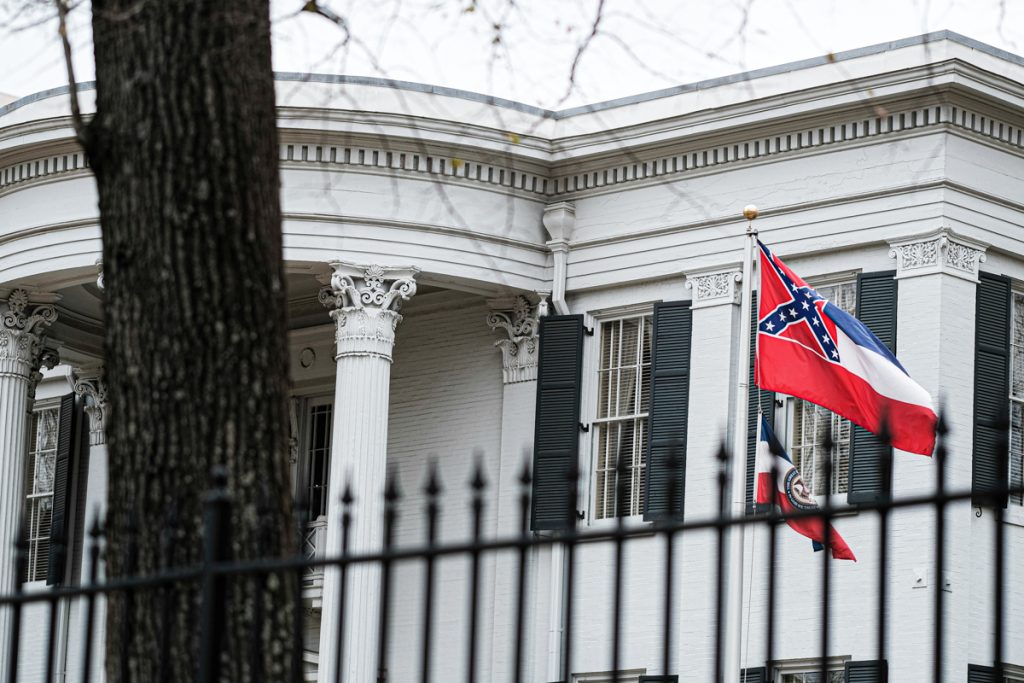Mississippi officials across the state will soon lower the Confederate-themed state flag for a final time after veto-proof majorities in both houses of the Legislature voted to retire it and begin the process of creating a new state flag. Gov. Tate Reeves, a Republican, has already signaled that he will sign the legislation.
The state flag must come off government flagpoles within 15 days of the bill’s passage. A committee will design a new flag, which it will submit to the governor in September. Voters can choose to accept or reject the committee’s design in November’s election.
“This is a glorious day that we have the nerve and the courage to change something that pretty well hurt, even though they may be afraid to say it, one million African Americans in this state,” Sen. David Jordan, a Black Democratic lawmaker, told his colleagues on the Senate floor today.
Sen. Jordan recalled how, in the 1940s, his brother had fought for the United States and against Germany in World War II. When his brother returned home to the Mississippi Delta, though, a new restaurant refused him service—even as eight German prisoners of war were able to eat inside.
“Sometimes, it’s been rough for people who came up in my generation, so this is a glorious day,” said the senator from Greenwood.
‘The Battle for a Better Mississippi’
In 2000, Jordan served on a commission that then-Gov. Ronnie Musgrove set up to discuss the possibility of changing the state flag. At one public hearing on the state flag in Moorhead, Miss., supporters of keeping the 1894 flag shouted down Black speakers and members of the committee, including Jordan.

During his address to lawmakers today, he recalled one white audience member’s reaction when he told the Moorhead crowd that he was in favor of “redesigning the flag to include all of us” because “this is a multicultural state.”
“What are you going to put on it, a watermelon?” a state flag supporter shouted at the November 2000 hearing, referencing a racist trope about African Americans.
“When I got up to speak, someone from the Klan hollered, ‘Watermelon.’ That’s supposed to have been embarrassing, insinuating that African Americans eat the fruit. I don’t know many Mississippians or southerners who don’t like watermelon, and you don’t either,” Jordan told his colleagues today, eliciting a silent chuckle and a smile from Lt. Gov. Delbert Hosemann, the white Republican Senate president.
“So let’s go ahead and vote on this historical flag,” Jordan continued. “Let’s build our state, and let’s make it an oasis.”
After the 2000 state-flag hearings, Mississippi held a referendum, and voters chose to keep the 1894 flag by a 2-to-1 margin. Times have changed, though. For the first time, a poll this month found that a majority of Mississippi supported changing the flag.
Minutes after Sen. Jordan’s speech today, his colleagues voted 37-14 to retire the current flag, an increase from the 36 senators who voted to allow debate on the bill yesterday. Hours earlier, the Mississippi House also voted overwhelmingly to change the flag, with a 91-23 margin that also increased from an 85-34 margin on allowing consideration of the bill yesterday.
Former Mississippi Gov. William Winter, who led the state flag commission in 2000, said in a statement this afternoon that he was “delighted by this positive move.”
“I’m especially grateful at age 97 to witness this step forward by the state I love. Of equal importance, I hope this may spark further action to meet the compelling social and economic needs of our state,” said Winter, a Democrat who held the state’s top job from 1980 to 1984. “The battle for a better Mississippi does not end with the removal of the flag, and we should work in concert to make other positive changes in the interest of all of our people.”
Winter, who began his early career as a segregationist, later changed his views and has long championed “racial reconciliation” causes in Mississippi. The William Winter Institute for Racial Reconciliation on the University of Mississippi campus is named in his honor.
Voters to Decide on New Flag in November
A nine-member commission will be tasked with designing a new bill, including three members appointed by the House of Representatives, three by Lt. Gov. Hosemann, and three by Gov. Reeves.
The bill requires that the governor’s appointees include a member of the Mississippi Economic Council; a member of the Mississippi Arts Commission; and a member from the Mississippi Department of Archives and History.

The bill includes two stipulations for the committee: the flag must not include the Confederate emblem, and it must include the words, “In God We Trust.”
Officials must make the committee appointments by July 15. The committee must turn over its recommended design to the governor by Sept. 14, 2020. Mississippians will vote “yes” or “no” on the flag on the day of the national election on Nov. 3, 2020. If Mississippians vote “no” this year, the process would restart, and the state would vote again in November 2021.
During debate in the House, Rep. Mark Tullos of Raleigh asked Rep. Jason White, a Republican sponsor of the bill from West, what would happen if Mississippians vote against committee’s design in 2020 and against the next design in 2021.
“It just keeps kicking back to the Legislature” and to the ballot each year, White responded.
Tullos asked what would happen if a majority never voted yes on a design.
“Under this bill, we would never have a state flag,” White replied.
‘Under the Shadow of a Symbol That Didn’t Represent Them’
On Saturday, House Rep. Missy McGee, a Republican sponsor of the bill, said that while voting to change was not a “tough” decision for her, she knew it was for some of her fellow lawmakers.
“I know for many of my colleagues, coming to a decision to vote ‘yes’ on taking down our current flag has been difficult,” the Hattiesburg lawmaker wrote tweeted. “Many of them have had to face down immense pressure from constituents who disagreed with them. Still, they stepped forward and will make one of the toughest (albeit best) votes of their career. I believe history will remember their courage.”

“I also hope history remembers the courage of the Legislative Black Caucus,” McGee continued. “For well over a half-century, our African American colleagues have faithfully come into the House Chamber to represent their communities while under the shadow of a symbol that didn’t represent them. Yesterday, one of those colleagues came up to me outside the chamber and said four momentous words: ‘We have the votes.’ It was an overwhelming moment, and I felt the emotion and quiet joy with which he said them.”
This evening, the Southern Poverty Law Center released a statement, urging Gov. Reeves to sign the bill into law “immediately.”
“While we are encouraged that the Mississippi Legislature passed this bill to remove a symbol that celebrates the Confederacy from our state flag, … this is just one step toward fully removing all Confederate monuments and symbols in the state and across the country,” said Brandon Jones, SPLC Action Fund’s Mississippi policy director. “These symbols were put in place to glorify white supremacy and represent ongoing systemic racial barriers that exist in education, healthcare and workforce equity in our country.”
The Mississippi Free Press is collecting and tracking Confederate monuments and memorials across the state with an interactive map.
In his statement, Jones called on the state’s legislators to continue listening to young Mississippians who are demanding change.
“We appreciate lawmakers who have diligently worked to remove the emblem from the flag, but also want to honor the thousands of young voices who have organized across our state and demanded that our leaders listen.”










